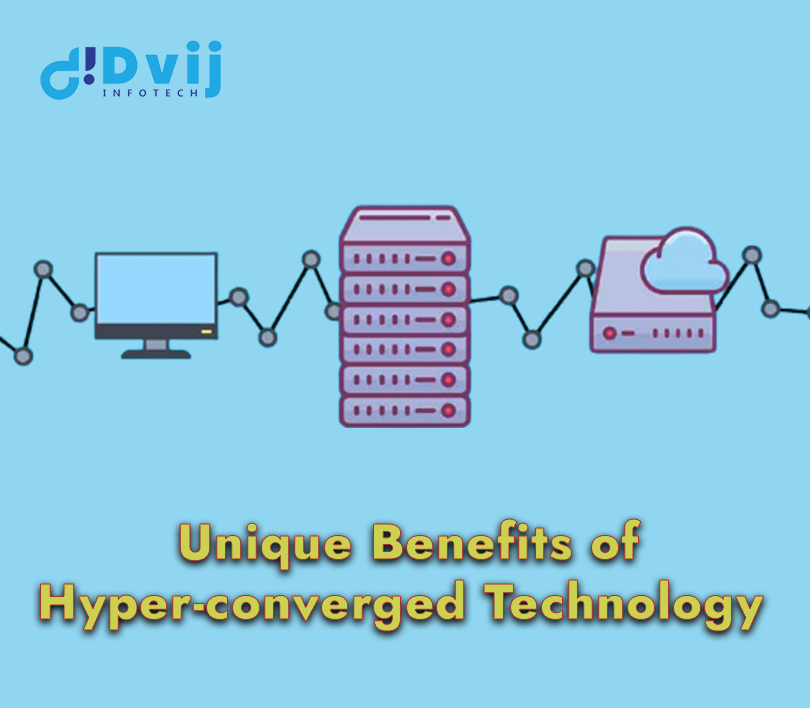Organizations have been using traditional data centers for many years. They rely on data center hardware and physical servers to store data, and they're constrained by the size of the physical space in which this hardware is kept.
The firm or organization would have to purchase extra physical servers and hardware to boost its storage capacity. As a result, a traditional data center is completely constrained by the physical constraints it faces, a condition that makes any type of corporate expansion a major undertaking fraught with risks. Hyperconverged systems can help in this situation.
What are Hyperconverged Systems?
Hyperconverged infrastructure (HCI) is a software solution that integrates storage, processing, and networking into a single system to reduce data center complexity and boost scalability. To achieve shared computing, multiple nodes are grouped together.
There are other advantages to implementing hyper-converged solutions into your IT strategy, aside from the fact that they require less physical equipment, gear, and space.
Adaptability
Hyperconverged storage solutions provide higher flexibility and overall agility as compared to older infrastructures that many enterprises now use. If you want your IT infrastructure to be genuinely adaptable, it has to be manageable by everyone in your organization, not just a few experts.
IT generalists can manage all infrastructure operating responsibilities with hyper-converged systems, allowing your IT specialists to focus on innovation and relevant business projects.
The ability to scale
Hyperconverged systems not only enhance flexibility but also help with scalability, which is something that most businesses struggle with. Hyperconverged systems may be set up and deployed in a matter of hours, allowing for rapid adjustments. You may grow storage and computation resources on an as-needed basis without having to make big infrastructure investments.
This ensures compatibility as additional levels of infrastructure is introduced without the need for massive, sweeping changes, allowing for significantly more efficient scaling than was previously allowed.
Effectiveness
The increased efficiency that hyper-converged systems can provide an organization is perhaps the most exciting benefit. Because the core principle of hyper-converged storage includes less physical equipment, it is far more cost-effective to maintain, support, and update this system than it is to maintain, support, and update a system based on a traditional infrastructure with integrated components.
New features and updates may be automatically integrated and installed thanks to the software-based infrastructure, which eliminates the need to purchase brand new components. Hyperconverged systems' total efficiency boost allows enterprises to be as flexible as possible, allowing them to offer services at a lower cost.
Reorganization
The capacity of hyper-converged systems to consolidate diverse IT tasks onto a single platform, when combined with the emphasis on efficiency, is extremely valuable to a wide range of enterprises. All workloads will run in a single location with these hyper-converged technologies, rather than in many separate, customized silos.
This makes it much easier to move data across multiple appliances and, perhaps, data centers, which is a challenging task with traditional infrastructure. The benefits of data consolidation will become apparent as enterprises grow more skilled and accustomed to dealing with these hyper-converged systems.
Safety and security
When it comes to data, one of the major concerns that both businesses and the general public have is that it is not effectively protected. Companies must do everything possible to ensure they are adhering to the highest standards of conduct as data protection policies and regulatory requirements around what is required continue to be strictly enforced around the world.
Hyperconverged systems are extremely helpful in this regard. When disaster recovery capabilities are built into the infrastructure, data protection capabilities become not only more efficient but also significantly more cost-effective.
Last Thoughts
It can feel like a losing battle to combat the ever-increasing tides of technical advancements. If corporate leaders do not adapt to the changes that are coming, they risk slipping behind. With each passing year, hyper-converged systems will become more common, and businesses must rethink their infrastructure strategy and adapt if they want to stay competitive.
Assuring that your data centers are completely prepared and optimized to handle cloud computing capabilities and the growing influx of data should be a top priority for all enterprises. The advantages of hyper-converged solutions eliminate many of the disadvantages of a typical data center design. You may get the flexibility and scalability you need to develop without sacrificing any level of security or efficiency by deploying successful hyper-converged data systems.
